Anti-Inflammatory Diet For Disease Prevention
An anti-inflammatory diet helps to reduce or control inflammation as it is associated with a healthy gut microbiome and the production of short-chain fatty acids, which provide fuel for intestinal cells. It is not about the quantity or portion of the food, however, it is about the selection and preparation of food, including anti-inflammatory properties, and helps you to control and reduce inflammation naturally.
What Is An Anti-Inflammatory Diet
As we know that Inflammation can be both beneficial (Acute) and harmful (Chronic). Some factors play an important role to induce and reducing, inflammation, Food is one of them. A diet that induces inflammation is called a pro-inflammatory diet Similarly, a diet that helps reduce inflammation is called an anti-inflammatory diet.
How An Anti-Inflammatory Diet Works
However, an anti-inflammatory diet helps remove the toxic side effects caused by medications, such as loss of memory, fuzziness, and sleeping disorder.
An anti-inflammatory diet can ease the pain intensity and reduce the inflammatory symptoms.
Anti-Inflammatory Diet May Improve In Following Medical Conditions
- Obesity
- Arthritis
- Hypertension
- Asthma
- Type-2 Diabetes
- Heart Disease
- Obesity
- Nonalcoholic Fatty Liver Disease
- Inflammatory Bowel Disease
- Cancer
- Depression
- Alzheimer’s Disease And Dementia
Food Pyramid Of Anti-Inflammatory Diet
Fruits
- Amount: 2-3 a day
- Food Choice: Fresh, organic and seasonal fruits
- Benefits: Fruits are rich in many essential nutrients like potassium, vitamin-C and folate, they are naturally low in fat, sodium and calories. Consuming at least 2 fruits a day maintain good health and lowers the risk of inflammation
Vegetables
- Amount: 4-7 a day
- Food Choice: Organic, rainbow vegetables, Raw or cooked
- Benefits: Choose organic, fresh and rainbow coloured vegetables, eat them raw or cooked. Vegetables are rich in folate, potassium and other nutrients. Eating vegetables helps to fight against inflammation, improve blood pressure, skin texture, eyes power, reduce the risk of cancer, diabetes type-2, and heart stroke
Beans And Legumes
- Amount: 1-2 a day
- Food Choice: Kidney beans, soybeans, chickpeas, black beans
- Benefits: Beans & legumes are rich in plant protein, antioxidants, iron, folate, calcium, potassium, phosphorus and zinc. They reduced the risk of cancer, type-2 diabetes, fatty liver, improves heart health, gut health and boost immunity
Soluble Fiber and Prebiotics
- Amount: 30-50 gm a day
- Food Choice: Green peas, broccoli, beans, banana, berries, garlic, dandelion greens, asparagus, nuts and seeds
- Supplement Choice: Acacia fiber, inulin, FOS, pectin, gaur gum
- Benefits: Fiber probiotics lower the risk of type-2 diabetes, heart stroke, improves gut health and reduce inflammation
Whole Grains
- Amount: 3-5 a day
- Food Choice: Amaranth, sorghum, buckwheat, quinoa, millets, steel-cut oats, brown rice,
- Benefits: Whole grain food provides many essential vitamins, minerals, fiber and other plant compounds. Consuming whole grains reduce the risk of obesity, heart disease, chronic inflammation, etc
Healthy Fats
- Amount: 5-7 a day
- Food Choice: A2 Ghee, olive oil, avocado, coconut, walnuts, sunflower seeds, sesame seeds, pumpkin seeds, chia seeds
- Benefits: Healthy fats lower the risk of heart stroke, lower bad LDL cholesterol level, increase HDL, maintain blood pressure, protect organs and fight against inflammation
Omega-3 Rich Food
- Amount: 2-3 tsp a day
- Food Choice: Flax seeds, walnuts, chia seeds, hemp seeds, seaweed & algae, kidney beans etc.
- Benefits: Omega 3 rich foods are good for cardiovascular health, helps in fighting against inflammation
Fermented Food
- Amount: 1-2 times a day
- Food Choice: Kefir, kombucha, probiotic yogurt, pickles, miso, kimchi, rice kanji, etc.
- Benefits: Fermented foods have probiotic bacteria, as a result, it is good for intestinal health and improves digestion and boosts immunity
Plant-Based Protein
- Amount: 1-2 a day
- Food Choice: Lentils, chickpeas, peanuts, quinoa, sprouts, bengal gram, etc.
- Benefits: Plant protein rich food are good for cardiac health, gut health, reduce the risk of inflammation
Healthy Herbs And Spices
- Amount: Unlimited Amount
- Food Choice: Curry leaves, bay leaves, turmeric, fennel seeds, coriander, fennel seeds, cinnamon, ginger, garlic
- Benefits: Herbs and spices have natural anti-inflammatory substances, use herbs and spices to season the food as it enhances the taste, flavors, and aroma of the food
Tea
- Amount: 2-4 cups a day
- Food Choice: Green tea, herbal tea, fennel tea & clove tea
- Benefits: Tea is rich in antioxidants and it helps to reduce inflammation. It is important to know to brew to tea properly to get its maximum benefits
Supplements
- Amount: Everyday specially essential list based on one’s physiology needs
- Food Choice: Consult with certified nutritionist
- Benefits: Supplements full fill your daily intake of nutrients if you are not able to get the daily required amount
Red Wine
- Amount: Optional (maximum 2-3 glass in a week), during socialisations and celebrations
- Food Choice: Red wine
- Benefits: In moderate amount red wine is considered good for the heart because of compound “resveratrol” which has anti-inflammatory and antioxidant property.
Healthy Sweets
- Amount: In a restricted quantity
- Food Choice: Dark chocolate, dried fruits and homemade sattu-cacao-laddu
- Benefits: Polyphenols presents in dark chocolate have anti-oxidant property
Guidelines For Anti-Inflammatory Diet
- Eat More Fruits And Vegetables
- Opt For Healthy Fats
- Choose Plant Based Protein
- Eat Mindfully
- Consume Whole Grain Carbohydrate
- Use Herbs And Spices
- Watch Your Portion Size
- Adopt Healthy Lifestyle and Choose Anti-Inflammatory Food
How To Make The Diet Anti-Inflammatory
A little change in diet by including food that shows anti-inflammatory responses and avoids the food that causes inflammation is good to lower the inflammation.
start with these simple diet modifications:
- Start your day with right breakfast that include seeds, nuts, eggs, yoghurt, vegetables like spinach, tomatoes, etc
- For cooking use extra virgin olive-oil, coconut oil, avocado oil, instead of sunflower or margarine oil
- Choose fruits over fried foods
- Swap your white bread with whole grain brown bread or sourdough bread
- Eat dark chocolate for sugar cravings
- Pick red wine instead of other alcohol
- Cut down simple carbohydrate like pasta, white bread, white flour food
- Eat omega-3 rich food like seeds, nuts, seaweed etc
- Include more fiber (green peas, beans, seeds, leafy veggies) in your diet
Food To Avoid In anti-Inflammatory Diet
- High sugar food for instances, candy, pastries, cakes, sweet snacks, etc
- Avoid soft drinks, fruit punches, and beverages
- Dairy products
- Trans fats like deep fried, commercially prepared food, etc
- Polyunsaturated oils, for example, cotton seed, grape seed, corn, sunflower oil
- Processed and red meat
- Alcohol
- Refined Carbohydrates like white bread, white pasta, white potatoes, etc
- Artificial food additive like MSG (monosodium-glutamate)
- Allergic food
The Bottom line
In conclusion, chronic inflammation is harmful and unhealthy, if not treated on time, however, it can lead to some serious diseases. An anti-inflammatory diet and holistic lifestyle may control and reduce inflammation and lowers the health risk. To sum up, try avoiding pro-inflammatory food and increase the consumption of anti-inflammatory food, this helps to minimize chronic inflammation in the body and improve the health condition.

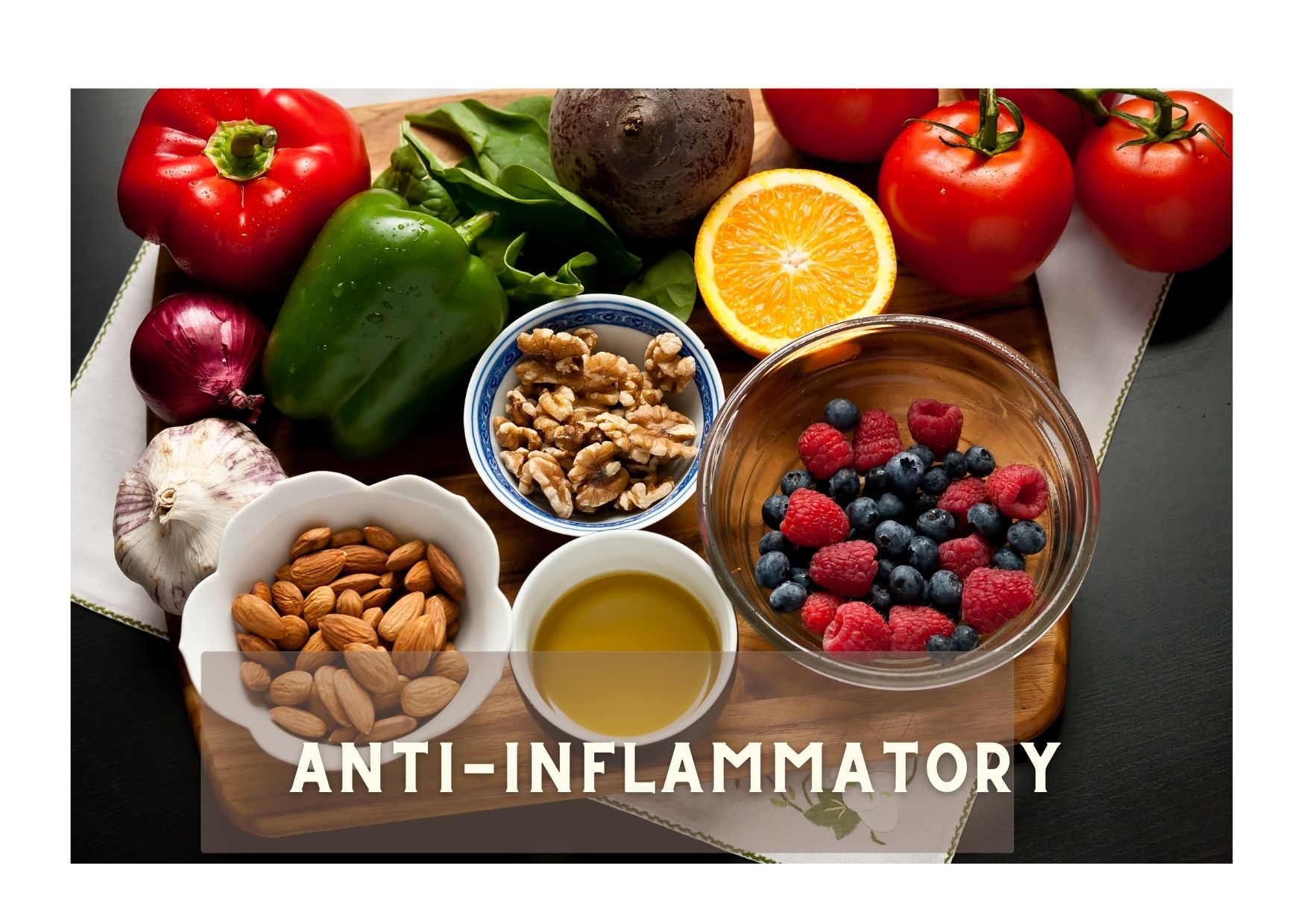
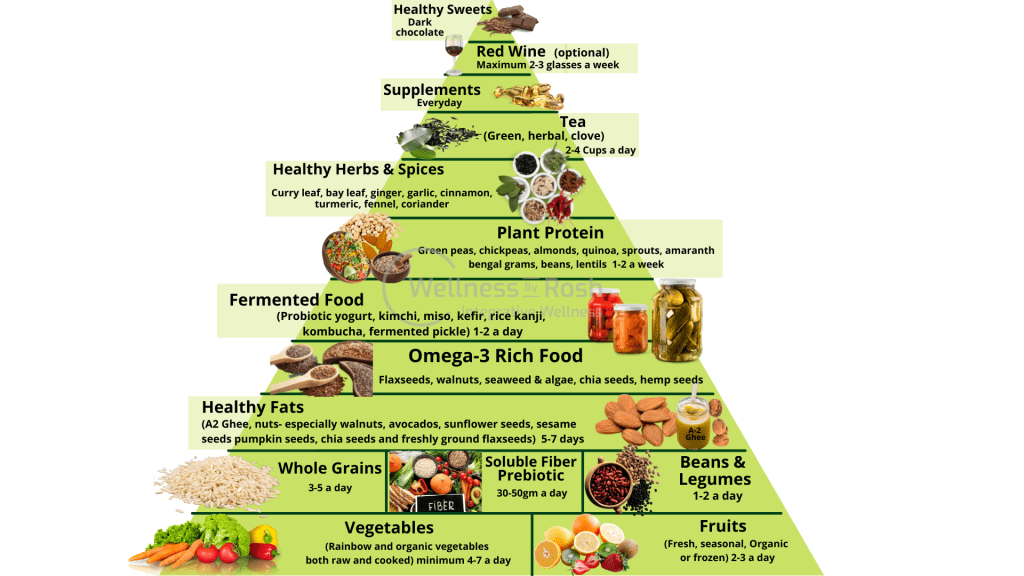
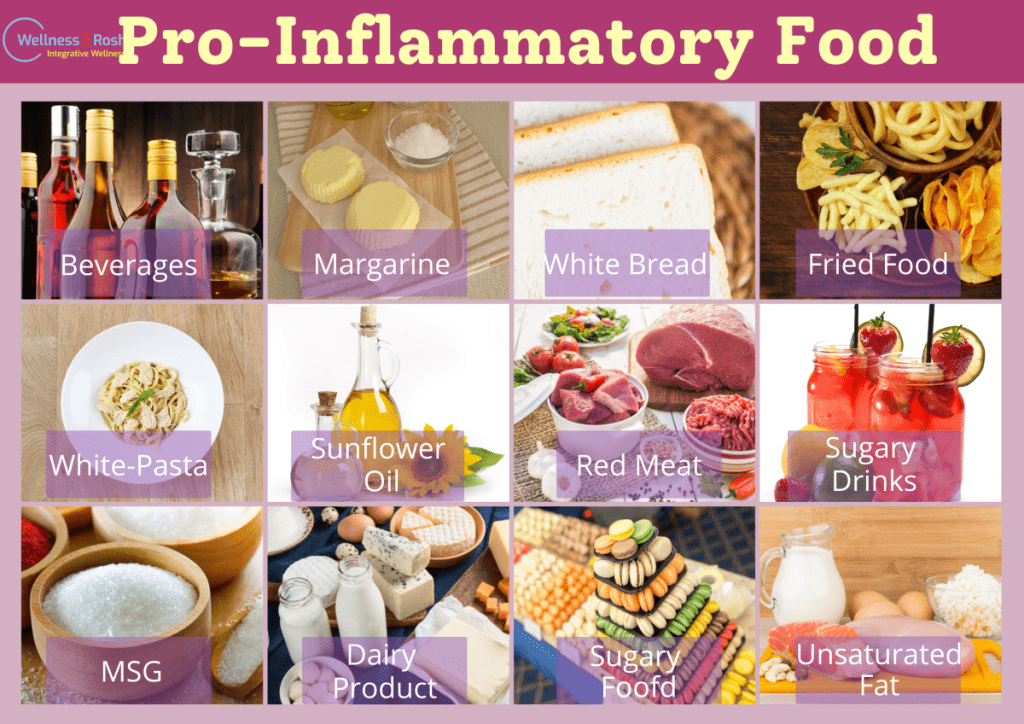

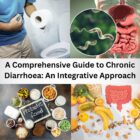

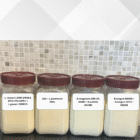



Do You have Small Intestinal Bacterial Overgrowth (SIBO)? - Wellness By Rosh
22-Sep-21[…] diet followed by anti-inflammatory diet can help to reverse […]
The Effect Of Oxidative Stress On Human Body - Wellness By Rosh
18-Oct-21[…] Some studies show the relationship between Inflammation and oxidative stress, so oxidative stress can be suppressed by an anti-inflammatory diet. […]
Intermittent Fasting (IF) or Time Restricted Fasting (TRF) - Wellness By Rosh | Integrative Wellness
7-Jun-22[…] seeds, protein-rich food, high fiber, and unprocessed food. For more information you can refer anti-inflammatory […]
Piroja
5-Aug-24Very informative post.
Wellness By Rosh
19-Aug-24Thank you so much for reading and taking time for writing feedback. Appreciate your support. Team WBR.